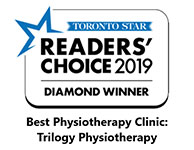
Concussion – Get back to being yourself again!
by Paul Godlewski, Vestibular & Concussion Physiotherapist
How we think about and treat concussions has evolved greatly. Not so long ago the main paradigm was: “Oh you’ve just had your bell rung, don’t be such a wuss, get back onto the horse.” In other words, denial that anything important had occurred. Then it turned into: “Oh my goodness, you’ve had a concussion! Go into a dark room until further notice.” In other words, catastrophizing. These days we are certainly more aware of concussions, and in part this has led to many more people to seek proper diagnosis and good treatment.
We now know that to get a concussion you need neither to lose consciousness, nor do you even need to receive a direct blow to the head. By definition, a concussion is a mild traumatic brain injury. The term mild is used because most imaging of concussions, such as an MRI, does not show anything. This is because the damage is at the cellular level. However, mild does not refer to how a concussion affects the individual. This can vary literally from a bump on the head to long-term issues. For this reason, concussions are said to be like “snowflakes” as no two concussions are alike, either between people, or for the same person.
It is only recently that the medical and greater community has started to get a better perspective on concussions and how best to manage and treat them. The most important thing is to get the correct balance between rest and activity. While rest is very important, it is now recommended that a newly concussed individual spend no more than 2-3 days in total “dark-room-rest.” Progressively getting back to activity is just as important as rest. Getting that balance right and knowing how fast to progress the individual takes the combined efforts of your doctor & brain rehabilitation professionals.
As concussions affect the function of the brain, they can affect many aspects of a person’s life: physically, mentally and emotionally. Good concussion treatments therefore work to restore the person in all of these areas, so that they can better get back to work, school, sport and play. Depending on the concussion, this may mean seeing just one kind of practitioner, such as a knowledgeable & experienced physiotherapist. Others times the person may need to see many clinicians working together collaboratively. Concussion Physiotherapy is a science-based, safe & drug-free form of treatment. To get back to being yourself again, contact us to book an appointment!
 0 Comment
0 Comment 




Leave A Comment